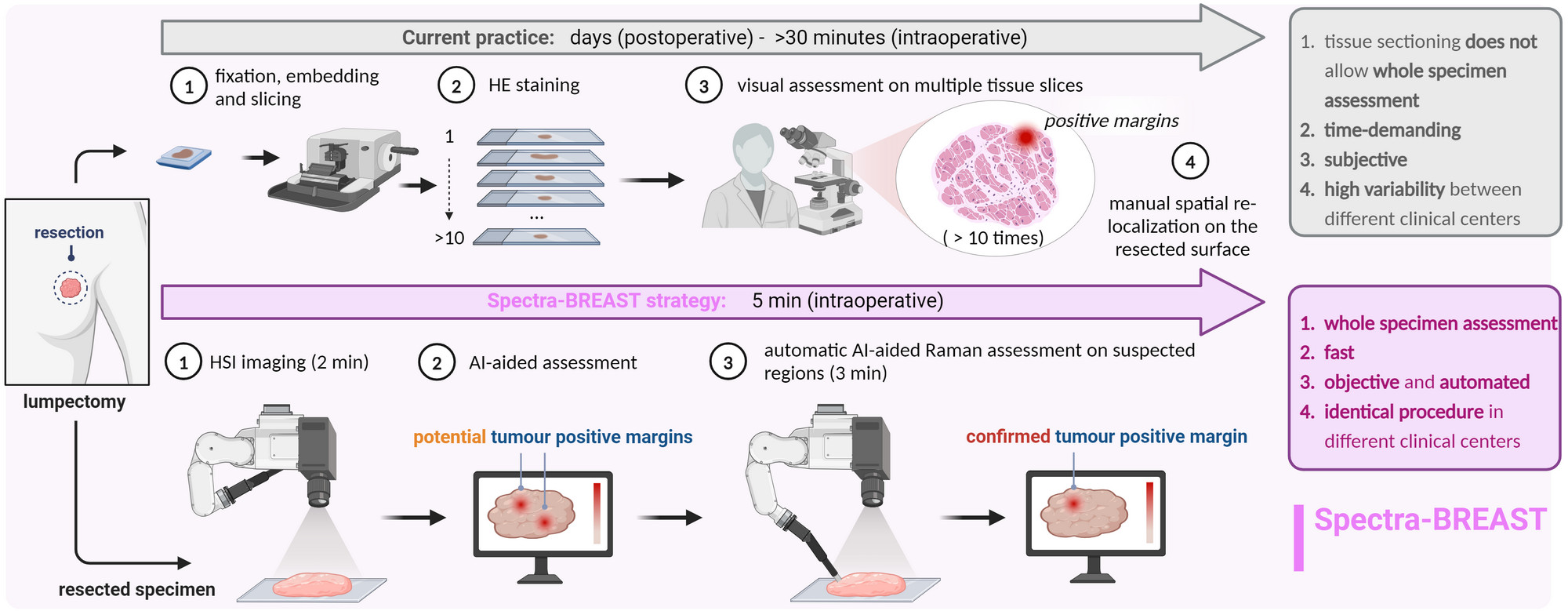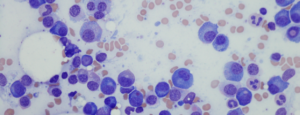Active Research Projects
Spectra-BREAST

Project title: Multimodal Hypersprectal Imaging and Raman Spectroscopy for Intraoperative Assessment of Breast Tumor Resection Margins.
Webpage: https://spectrabreast.eu/
Funding agency: European Innovation Council under the Pathfinder Open 2024 framework (Call HORIZON-EIC-2024-PATHFINDEROPEN-01-01).
Dates: from 2025 to 2028
Budget: approximately € 3.000.000,00
Objectives: Spectra-BREAST will introduce an advanced multimodal solution that combines a custom-designed Hyperspectral Imaging (HSI) system, fiber-optic Raman Spectroscopy (RS), and AI algorithms. First (1), a next-generation HSI camera will rapidly scan the entire resected specimen in 2 minutes, detecting suspicious or close tumor margins. Then (2), AI models will guide a robotic arm equipped with a fiber-optic Raman probe to precisely target these regions and perform in-depth spectral analysis (3) to confirm tumor presence up to 2 mm beneath the tissue surface. This integrated workflow will deliver real-time, highly accurate feedback (sensitivity and specificity >95%) in under 5 minutes, enabling surgeons to achieve complete tumor removal in a single procedure and reducing reoperations by up to 90%.
LIA-UPM is in charge of the development of AI models to analyze HSI and Raman spectra detecting cancer cells.

This project has received funding from the European Union’s Horizon 2020 research and innovation programme under Grant Agreement No #101187508
BIOCELLPHE

Project title: Ultrasensitive BIOsensing platform for multiplex CELLular protein PHEnotyping at single-cell level (BIOCELLPHE).
Webpage: https://www.biocellphe.eu/
Funding agency: H2020-EU.1.2.1.
Dates: from April 2021 to October 2025
Budget: € 3.577.312,50
Objectives: BIOCELLPHE provides frontier scientific and technological advancements to generate a breakthrough technology realizing the identification of proteins as diagnostic biomarkers at single-cell level with unmatched sensitivity, multiplexing capabilities and portability. BIOCELLPHE proposes the generation of engineered bacteria able to recognize and bind to specific protein targets on the surface of circulating tumor cells (CTCs) responsible for cancer metastasis, thereby triggering the production of chemical signals that can be detected simultaneously, and with extremely high sensitivity by surface-enhanced Raman scattering (SERS).
Our role in this project is to develop artificial intelligence algorithms capable of analyzing SERS spectra to identify patterns in the data that provide information for the detection and identification of Raman reporters on the surface of CTCs.

This project has received funding from the European Union’s Horizon 2020 research and innovation programme under Grant Agreement No #965018
cancer digital twins

Project title: Interacción longitudinal de datos generados por paciente y determinaciones multi-ómicas para una oncología de precisión integral en cáncer de la mujer.
Project code: PMP22/00032
Webpage: https://cancerdigitaltwins.com/
Funding agency: NextGenerationEU
Dates: from January 2023 – January 2026
Budget: 132.000€
Objectives: The Digital Twins Study, led by the Spanish National Cancer Research Center (CNIO), explores the transition from precision medicine to High-Definition Medicine. This study collects a vast amount of information from participating patients such as: clinical data for each patient, molecular data from the patient’s tumor and information about habits, lifestyle, and environmental risks.
Utilizing wearable electronic devices, real-time monitoring of data such as physical activity, heart rate, emotions, blood pressure, or oxygen saturation will be conducted. This extensive dataset will be integrated through Artificial Intelligence to establish predictive models.
With the insights gained from this study, future expectations include the ability to create Predictive Models of patients (“Digital Twins”) to predict the course of their disease, personalize the assessment of treatment effectiveness and evaluate the optimal approach to treating each patient.



AI-4-AMR
Project title: Deciphering bacterial infections with artificial intelligence tools and biocircuit engineering (AI-4-AMR).
Project code: PID2022-142815NB-I00
Funding agency: Plan estatal de I+D+i. Proyecto de generación de conocimiento 2022. AEI
Dates: September 2023 – September 2026
Budget: 177.500€
Objectives: World Health Organization (WHO) has declared that Antimicrobial Resistance (AMR) is one of the top 10 global public health threats facing humanity. The GOAL of this project PID2022-142815NB-I00 is to fight against AMR developing new antibiotics and new strategies to stop the appearance of antimicrobial resistance to antibiotics. For achieving that Goal, we will pursue the following objectives during this project:
of how bacteria infect us.
spread. Better understanding of how multicell bacteria consortia behaves
and how plasmids and antibiotic resistance are transmitted between
bacterial cells.
to engineer/reprogram bacteria to make them smart living drugs.

Funding agency: PERTE para la salud de vanguardia. Medicina personalizada.
T3SS
Project title: Placing the T3SS effector-network paradigm within a systems level understanding of in vivo infection.
Funding agency: Wellcome Trust
Dates: February 2022 – May 2027
Budget for LIA Group: 64.452,5€
Objectives: The study, funded by the Wellcome Trust, focuses on gut mucosal surfaces, emphasizing their susceptibility to infections and the global health concern posed y diarrheal diseases. The overarching goals include exploring the “effector network” paradigm, investigating age and host genetic background influences on the expansive effector network, constructing computational models to predict infection outcomes, and studying signal transduction from effector injection into intestinal epithelial cells to immune responses.
Past Research Projects
Hacia la Inteligencia Artificial in vivo: programación de fármacos multicelulares vivos inteligentes.
Project title: Hacia la Inteligencia Artificial in vivo: programación de fármacos multicelulares vivos inteligentes.
Project code: PID2019-106960GB-I00
Funding agency: Plan estatal I+D+. Ministerio de Ciencia. AEI.
Dates: 2020 – 2024
Budget for LIA Group: 87.120€
PLASWIRES
PLASWIRES (PLASmids-as-WIRES), “Engineering Multicellular Biocircuits: Programming Cell-Cell Communication Using PLASmids as WIRES” is a synthetic biology FET-Proactive European research project (Future and Emerging Technology) coordinated by LIA-UPM in which we have designed and engineered a programmable antibiotic.
PLASWIRES’ main goal: To show how to program a parallel distributed living computer using conjugative plasmids as wires between cellular processors.
Additional information: http://www.plaswires.eu/
InGEMICS
InGEMICS (Ingeniería Microbiana, Salud y Calidad de Vida) is a Madrid interdisciplinary research project that integrates omics technologies with data analysis and mathematical modelling tools to confront some of the current most relevant challenges in Biomedicine and particularly those ligated to the comprehension and manipulation of microbial systems and their interactions.
Additional information: http://www.ingemics.es/
EVOPROG
We are also partners in the project on synthetic biology called EVOPROG: “General-Purpose Programmable Evolution Machine on a Chip“. Start: October, 2013. Duration of the project: 36 months.
Additional information: www.evoprog.eu
TIN2016-81079-R
Spanish Project TIN2016-81079-R titled: “Ingeniería de biocircuitos programables para computación analógica, multicelular y espacial.”
TIN2012-36992
Spanish Project TIN2012-36992 titled: “ENGINEERING and PROGRAMMING BIOCIRCUITS: DESIGN and IN SILICO MODELING”.
MTM2014-54053-P
Spanish research project “Ecuaciones en diferencias y aproximación constructiva: teoría y aplicaciones”, Ref. MTM2014-54053-P. Duration of the project: 36 mothns. Start: January, 2015.
BACTOCOM
Bacterial Computing with Engineered Populations (BACTOCOM): LIA Group has participated also in the European Synthetic Biology project called BACTOCOM.
TIN2009-14421
Modelling of biological processes using P Systems and designing new biomolecular computing devices: Proyecto TIN2009-14421. Funded by MICINN. Dates: Jan. 2010 – Dec. 2012. PI: Alfonso Rodríguez-Patón.
